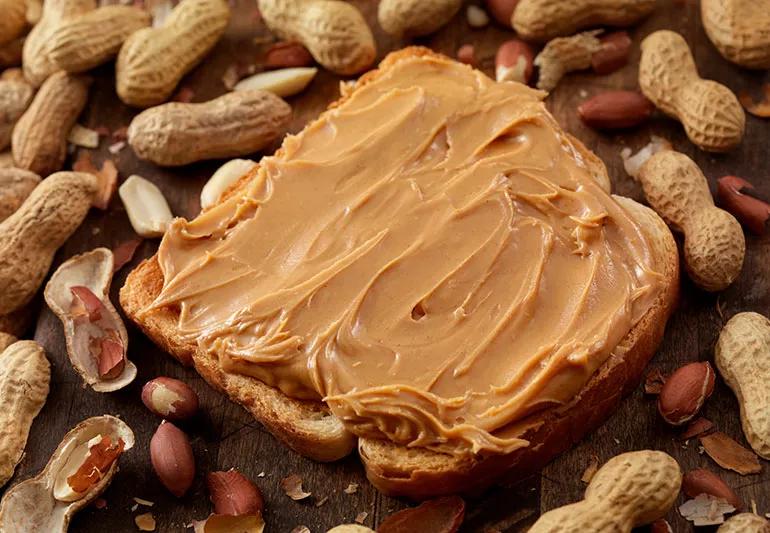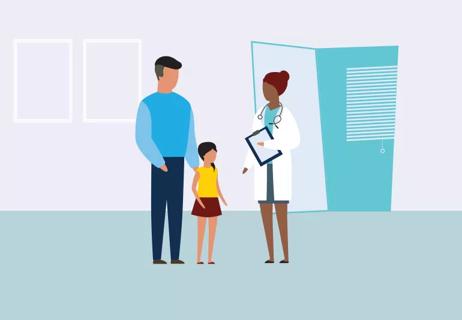New treatment offers hope for outgrowing the life-threatening condition

If your child has a life-threatening peanut allergy, ongoing research suggests they may be able to grow up and do the unthinkable: Eat and enjoy a peanut butter and jelly sandwich.
Advertisement
Cleveland Clinic is a non-profit academic medical center. Advertising on our site helps support our mission. We do not endorse non-Cleveland Clinic products or services. Policy
A treatment program focused on peanut-allergic preschoolers and babies has proven effective at helping children overcome their food allergy, says allergists Sandra Hong, MD, and Jaclyn Bjelac, MD.
It’s a life-changing — and perhaps lifesaving — outcome. Let’s learn more from Dr. Hong and Dr. Bjelac, part of the leadership team at Cleveland Clinic’s Food Allergy Center of Excellence.
Currently, it’s estimated that nearly 1.5 million children in the United States live with a peanut allergy. They wake up every day with the knowledge that one bite of the oh-so-prevalent food could be deadly.
A food allergy is a condition where your body’s immune system identifies a food (such as peanuts) as harmful. Your immune system launches into attack mode and releases antibodies to combat the threat.
The reaction can lead to hives, vomiting or — in worst-case scenarios — constrict airways and lead to death. “The percentage of fatal food allergy reactions is disproportionately attributable to peanuts in the United States,” says Dr. Bjelac.
Peanuts are one of the nine major food allergens that cause the most serious allergic reactions. More than 6.1 million people in the United States have a peanut allergy. It’s the most common allergy among children.
Advertisement
Approximately 200,000 people a year in the United States land in the emergency room due to a food allergy reaction, such as anaphylaxis. That’s equal to one ER trip every three minutes of every day.
Digging deeper into the numbers, more than 40% of children with food allergies have experienced a severe allergic reaction.
Video content: This video is available to watch online.
View video online (https://cdnapisec.kaltura.com/p/2207941/sp/220794100/playManifest/entryId/1_fwfawfvx/flavorId/1_5f3sgelj/format/url/protocol/https/a.mp4)
Overcoming Peanut Allergies
Ready for an irony? It seems the best way to help children overcome peanut allergies is to slowly expose them to the food.
An early peanut oral immunotherapy (EPOIT) treatment program developed at Cleveland Clinic has been effective at “reteaching the immune system to stop overreacting to peanuts,” explains Dr. Hong.
In the program, children age 4 and younger who are allergic to peanuts built a tolerance to peanuts by ingesting minuscule amounts of the food in a step-by-step, allergist-supervised process. Doses are increased gradually over many months.
The minimal goal is to help these children achieve at least “bite-proof” tolerance to peanuts, meaning they can consume nearly two peanut kernels without a reaction. That guards against an accidental nibble of a food with peanuts leading to a health emergency.
“That can be hugely liberating,” says Dr. Bjelac. “If you bite into a cookie and suddenly realize it has peanut in it, nothing should happen. It’s a level of protection that wasn’t there before.”
Even better? Many participants in the treatment program see their immune system response change so much that they can fully eat peanut products. (Read about one child’s successful experience.)
“They can live their lives as if they never had a peanut allergy,” Dr. Bjelac adds.
The key with EPOIT is the age of the participants, as reactions to food allergens typically are less severe in early childhood. “Their immune system is so malleable, so flexible, that they can tolerate it,” notes Dr. Hong. “There is this narrow window where we can do this.”
The series of peanut challenges given to participants involve tiny amounts of the food. In the initial treatment cycle, for example, the daily dose is 8 milligrams of peanut protein. Small increases follow every two weeks if there aren’t any setbacks.
Every uptick in peanut butter dosage takes place in an allergist’s office in case there’s a reaction. (“This is not something you do at home,” stresses Dr. Hong.) The child is monitored for an hour after the higher dose.
The process takes about four to six months, with maintenance dosing then continuing for at least a year.
Of the children in the Cleveland Clinic program, more than 80% develop “bite-proof” tolerance or are building up to that level. “For us to be able to help someone move past a food allergy — it’s the most rewarding part of our careers,” says Dr. Hong.
Advertisement
Building tolerance to an allergen through exposure is a relatively new concept and a reversal from clinical guidelines shared by allergists just a decade ago.
As food allergy numbers began spiking in the 1990s, doctors recommended that allergenic foods such as milk, eggs and peanuts be removed from the diets of children with a high risk of allergies.
But that thinking began to change, as research showed that eliminating specific foods didn’t slow the development of food allergies. In fact, the groundbreaking Learning Early About Peanut (LEAP) allergy study in 2015 found that peanut allergies decreased in at-risk children with an early introduction of the food.
“It was completely the opposite of what we had believed,” notes Dr. Hong.
Another outgrowth of the study? In 2017, the National Institute of Allergy and Infectious Diseases recommended that peanuts be introduced to infants as young as 4 months old to help prevent a peanut allergy from emerging.
Currently, 1 in 5 children with a peanut allergy outgrows the condition before adulthood. Dr. Hong and Dr. Bjelac say treatment advances could reverse those numbers, with as many as 4 in 5 children leaving their peanut worries behind with the boogeyman and other childhood fears.
Advertisement
In 2020, the U.S. Food and Drug Administration (FDA) approved a medication called Palforzia® to lessen allergic reactions to peanuts in children ages 4 to 17. It’s the first treatment drug for children with peanut allergies.
In addition, there’s work being done on epicutaneous immunotherapy, where a patch with small amounts of peanut allergen sends peanut protein through the skin to build tolerance.
Dr. Hong believes the number of children with severe peanut allergies will soon begin to decline.
“We’re moving toward a cure,” she says, “and a lot less worry for families.”
Advertisement
Learn more about our editorial process.
Advertisement

More than 90% of allergic reactions can be linked to these foods

Be prepared, read up, team up, trust your gut and advocate

It’s likely a short-term sensitivity (not an allergy) to acidic foods

Try foods first to see if your child has a reaction

Symptoms can be similar, but affect your body in distinct ways

The short answer from a pediatric allergist/immunologist

Shellfish is the top food allergen in adults

The emergency room is for serious medical issues; urgent care can help when you can’t get a quick appointment with your child’s doctor

The tropical fruit is a good source of antioxidants and vitamin C

Most people fall asleep within 10 to 20 minutes, but if your experience is different, adjusting your sleep schedule may help

Exploring your hidden side can lead to better understanding of what makes you tick